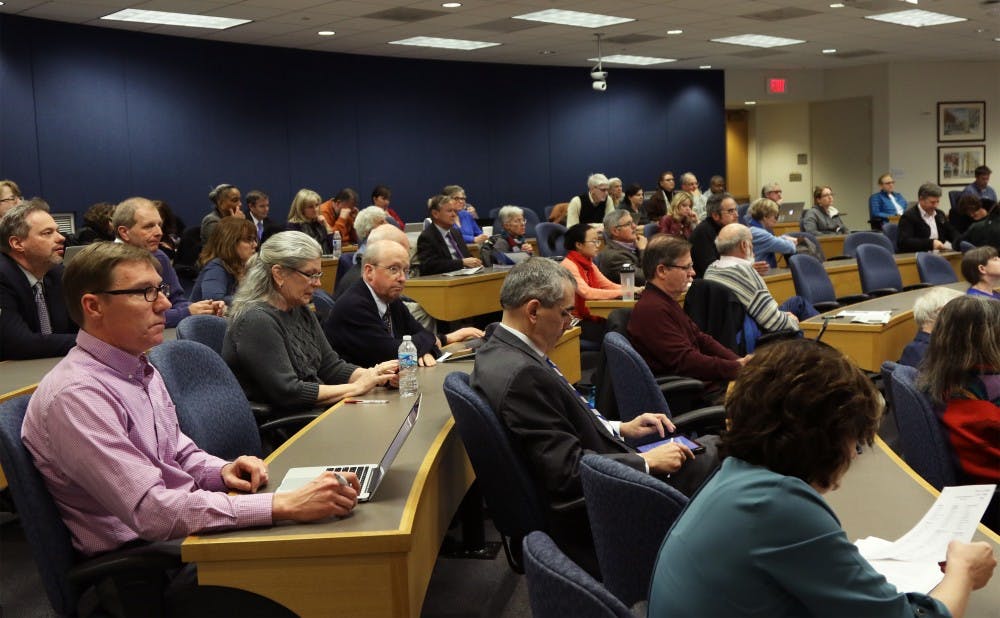The co-chairs of President Richard Brodhead’s Task Force on Bias and Hate Issues presented an overview of their committee to the Academic Council during its meeting Thursday.
The Task Force on Bias and Hate Issues was created after the first open forum between students and administrators Nov. 13 and held its first meeting Jan. 21. The task force co-chairs Linda Burton, James B. Duke professor of sociology and dean of social sciences, and Kelly Brownell, dean of the Sanford School of Public Policy, presented their key guiding questions, the internal structure of the task force and a list of faculty and student members before taking questions from the Academic Council.
“We don’t only want to be there when the conflict arrives,” Burton said. “We want to be able to help Duke develop a climate where we raise the consciousness of everybody here and help them to be aware of the fact that working on hate and bias issues is a daily task for us to be vigilant about.”
The task force concentrate on evaluating whether current university practices on issues of bias and hate are adequate, determining whether there should be a policy that prohibits or punishes certain expressions of bias or hate, determining how to aid students who have experienced bias or hate incidents and deciding upon what actions can be taken to prevent bias and hate incidents.
These questions will be addressed by six working groups within the task force. One of the goals of the Best Practices working group will be comparing Duke’s policies on hate and bias to those of other institutions. The Prevention, Learning and Resources working group will examine the psychology of hate and bias in order to maintain and sustain a welcoming environment. The Listening Tour working group is in charge of receiving feedback and meeting with as many students and faculty as possible. The other working groups are Communication and Outreach, Data and Survey Information and Legal, Definition and Speech Issues.
Burton and Brownell responded to questions after their presentation. During the question time, Brodhead and Provost Sally Kornbluth also answered some questions from faculty.
“We unanimously agreed in our first meeting that if we weren’t all committed to...having a very specific product, then we should not be there,” Burton said. “We definitely intend to have not only a report but recommendations as well.”
The co-chairs also agreed to reach out to the School of Nursing, the International House and the Divinity School’s Sacred Worth group, a student organization for LGBT concerns, all of which they had not reached out to previously. Burton encouraged students who have experienced micro-aggressions to meet with or contact members of the committee, and added that the future website for the Task Force would have a contact form for students as well.
In other business:
The proposed Duke-National University of Singapore joint Ph.D. in Integrated Biology & Medicine was unanimously passed and will move on to the Board of Trustees for final approval. A proposed name change for the Master of Arts in Historical and Cultural Visualization to the Master of Arts in Digital Art History/Computational Media was unanimously passed and will also move on to the Board of Trustees for final approval.
Professor of Romance Studies Deborah Jenson presented a proposal on behalf of the Franklin Humanities Institute requesting authority to hire regular-rank, non-tenure track faculty, which will be voted on in the March Academic Council meeting. Jenson is the current director of the Franklin Humanities Institute, which is one of six University institutes that promote interdisciplinary studies throughout the University. She pointed out that the other University institutes that have applied for the same hiring authority—including the Duke Global Health Institute, Duke Institute for Brain Sciences and the Social Science Research Institute—have all been granted authority.
During the question and answer period, the hiring processes were discussed. Faculty raised concerns that Duke was drifting toward non-tenure faculty and that professors themselves were being compartmentalized between “researchers” and “teachers.”
Get The Chronicle straight to your inbox
Sign up for our weekly newsletter. Cancel at any time.

